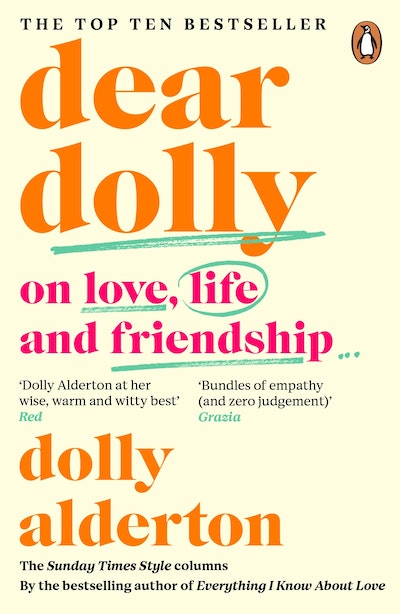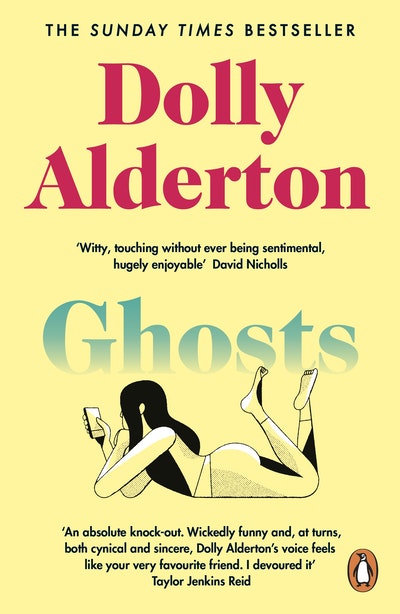- Published: 27 June 2023
- ISBN: 9780241998137
- Imprint: Penguin General UK
- Format: Paperback
- Pages: 256
- RRP: $26.99
Dear Dolly
On Love, Life and Friendship, the instant Sunday Times bestseller
Extract
Dear Dolly: ‘I need help breaking up with a friend’
I need help breaking up with a friend. ‘Emma’ and I have been friends since we were children and we’re now in our mid-twenties and have been living together for about a year. We’ve got a little longer left on our contract, but when that’s over I think I want to both physically and mentally distance myself from her.
We’ve had no serious bust- up, it’s been a slow and uncomfortable series of arguments, snide remarks and passive-aggressive WhatsApp messages that have led us here. Though she has always supported me through break-ups, work issues and money trouble, I feel like my life would be calmer and simpler without this friendship. Do I owe her an explanation, though I can’t fathom exactly what’s gone wrong between us myself?
Would it be wrong to simply ghost her?
I have been in the handing-out-unwarranted-advice game since I acquired language, and the agony-aunting game for just over four months now. Every week my editor sends me a selection of letters from which to choose, and I file them all into a document. There are the very specific questions (‘Should I send my ex something I made in my pottery class?’), there are some that do not require a page’s worth of rumination (‘Should I get a fringe cut?’) and then there are the same problems that appear in different guises every single week. Without fail there is always a woman worrying about how to break up with a close friend.
I say this to reassure you – it is one of the most common relationship anxieties, and yet is so mired in guilt. I think we worry that a finished friendship always means failure, when actually it can mean freedom. If a friendship can’t evolve as its two participants mature and change, it’s likely that they’ll grow out of it. This doesn’t mean that it hasn’t enriched you and it doesn’t make your memories null and void. Your relationship and shared story is an achievement (childhood to mid-twenties – that’s longer than the median length of a marriage!). It just may not serve you any longer.
But before you work out an exit strategy, I think you need to do some forensics on the friendship. You say that you don’t know why you’ve drifted apart, but the timeline suggests that the problems began when you moved in together. The issues you mention – arguments, passive-aggressive WhatsApp messages – reek of domestic quarrelling. (I lived with housemates for seven years and I am more than familiar with the ‘Hey just went to get my Marmite out of the cupboard and noticed a recent knife mark in it that I don’t recognize??? Would be great if someone could clear this up????’ texts.) It could be that you’re describing an incompatible flatmate rather than an incompatible friend. If so, you may find that not living together returns your relationship to a relaxed and respectful place without confrontation. Some friendships simply can’t withstand flat-shares – there are many people in my life who I adore, but there aren’t enough jars of Marmite in Christendom to get me to live with them.
If you absolutely know that the friendship has naturally come to an end, I would still avoid a big goodbye speech. Those conversations, which are basically one person telling the other one all the things that are wrong with them, can be traumatic. Anyone who has had a friend explain exactly why they don’t want to be friends any more can attest that the reasons never quite leave you (thanks, ********* ***** in Year 9 during that lunch break). The fact that you don’t know exactly why you’ve become distant means it’s probably more mutual than you think – those dynamics of long-term relationships rarely change without both parties being aware of it.
Which doesn’t mean you should ghost her. That is both cruel and cowardly. What I suggest instead is a slow and subtle cooling-off period, which often happens after two people move out of a shared home anyway. If she is hurt or asks for answers, then you should be honest with her. Do this kindly – describe the changes you’ve noticed in your friendship, rather than the flaws you see in her. Tell her that you cherish everything she has given you, but that you think the friendship might have run its course. If she doesn’t agree, there’s an opportunity for a conversation in which you both share your feelings and find a way to communicate clearly again.
And while I don’t think you should retain a friendship with someone who makes you unhappy, I do encourage you to be open to adaptation rather than a break-up. Friendships can change to become healthy without ending entirely. It might be that you share less with each other, she might become someone you see twice a year on your respective birthdays. History alone can’t hold a friendship together, but it does become something you value more and more as you get older. One day, to your surprise, you may find she’s the only person you want to call. And you might not be best friends, but you’ll be happy to hear each other’s voice.
Dear Dolly Dolly Alderton
From the bestselling and beloved author of Everything I Know about Love and Ghosts: a collection of her favourite Dear Dolly agony aunt letters and answers from her hugely popular Sunday Times Style column: with an introduction by Dolly.
Buy now











